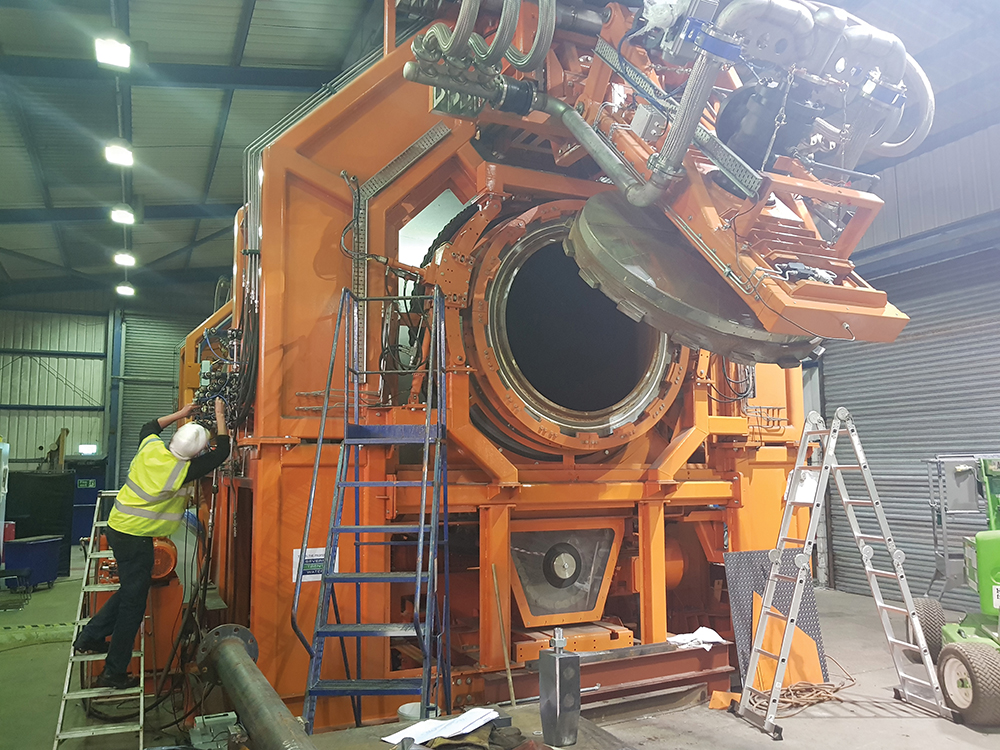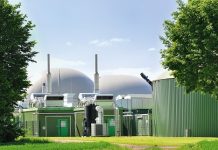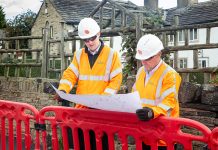The answer is the autoclave. Many parts on planes are cured using autoclaves while a Poole-based high value engineering company has pioneered the use of autoclaves in the waste industry.
AeroThermal has developed an advanced anaerobic digestion system which uses an autoclave for thermal pressure hydrolysation (TPH). This pre-treats food waste and other bio-waste organics prior to going to mesophilic anaerobic digestion.
A 65m3 TPH vessel is currently being installed at a new bio-waste anaerobic digestion site in the Midlands and will handle almost 50,000 tonnes of food waste per year. It is a key component at the new facility and has been provided in partnership with Jones Celtic Bioenergy.
During each hydrolysation cycle, food waste is shredded to less than 50mm in diameter before being transferred to the vessel. Here it is then put under vacuum and sterilised with steam. The drum rotates and some liquid is added.
The process breaks down all the cellulosic material and a substance like wet earth emerges and is collected in a discharge tank. This is screened and the organic part goes into the anaerobic digesters, producing high yields of biogas, which will be upgraded and injected into the national gas grid.
AeroThermal has demonstrated that pre-treating food and packaging waste in the TPH before anaerobic digestion significantly increases methane generation and substantially reduces the amount of material requiring disposal.
Christian Toll, AeroThermal’s CEO, said: “We have conclusively proven that there are significant advantages in applying thermal hydrolysis to a wide range of waste materials, including the efficient separation of food waste, and ultimately recovering feedstock for anaerobic digesters for energy production.
“We are proud to have developed this system in partnership with Jones Celtic, and we are looking forward to our autoclave generating significant quantities of green energy from waste that would otherwise go to landfill.”
Scientific tests conducted by the company’s in-house laboratory have conclusively proven that there are significant advantages with prior-thermal hydrolysation of food waste. It can be used on cross contaminated materials eg packaging (plastics, paper, metals)and food waste together.
The high temperature and steam environment break down all the organics, achieving very high conversion into feedstock and very high recovery rate of re-cyclables. Paper and cardboard is turned into feedstock for the anaerobic digester.
AeroThermal research showed that pre-treating black bag municipal waste in an autoclave before sending it to anaerobic digestion could increase methane generation by over 300% and substantially reduce the amount of material requiring disposal.
In this case the autoclave was initially evacuated using a vacuum pump to remove incondensable gases which were filtered out in activated carbon filter beds. The autoclave was then brought up to pressure and temperature by the injection of steam and when the temperature had equalised throughout, the autoclave load was left to “cook”.
Test results revealed that autoclaving gives a very high gas yield (about 150m3/tonne). Autoclaving also greatly increased the fraction of the waste that could be digested, as well as the gas yield from each kilogram of waste sent to the digesters which substantially reduced the amount of material requiring disposal.
The experiments were carried out in AeroThermal’s contract R&D facility, which specialises in the examination of the anaerobic biodegradation potential of different waste materials. The company has a team of scientists and the latest high-tech equipment, including 36 laboratory-scale constantly stirred digesters which can deliver:
- Bio Methane Potential (BMP) testing
- Semi-continuous anaerobic digestion testing
- pH measurement
- DS & VS testing
- Biogas composition
- COD
- Volatile Fatty Acid (VFA) measurement
- Ammonia Nitrogen and Total Nitrogen analysis
Another benefit was that autoclaved materials were less susceptible to the development of high VFA concentrations than un-autoclaved material and steam consumption was in close agreement with predictions.
Christian Toll added: “Our research has proven conclusively that autoclaving can make waste disposal more cost effective and less damaging to the environment.
“This is a win-win in anybody’s book! Now we’re seeing this technology made a reality in a state-of-the-art facility. TPH delivers real efficiencies in generating energy from waste, and we will be rolling out this technology across the UK and indeed globally in the coming months.”
AeroThermal is a British company with over 35 years’ experience in designing and manufacturing bespoke autoclaves for world-leading companies in the waste, aerospace, motorsport, military, electronics and tobacco sectors.
Members of the AeroThermal team have helped design, build and operate more than 40 anaerobic digestion systems that process waste, sewage and farm substrates in the UK and China.
For more information, visit:
www.aerothermalgroup.com.






